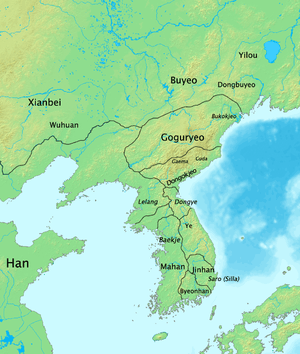Yilou
Yilou is the modern Chinese name of a people in 3rd- to 6th-century Manchuria.
| Yilou | |
|---|---|
 | |
| Chinese name | |
| Traditional Chinese | 挹婁 |
| Hanyu Pinyin | Yìlóu |
| Baxter–Sagart (2014) | */qip-[r]o/ |
| Korean name | |
| Hangul | 읍루 |
| Revised Romanization | Eumnu |
| McCune–Reischauer | Ŭmnu |
| Alternative names | |||||||||||
|---|---|---|---|---|---|---|---|---|---|---|---|
| Sushen | |||||||||||
| Traditional Chinese | 肅愼 | ||||||||||
| Simplified Chinese | 肃慎 | ||||||||||
| |||||||||||
Their name was also written as Sushen, after an earlier people in the same region. Although it is common to link the Yilou to the earlier Sushen or the later Mohe (and hence to the Jurchens who founded the Jin Dynasty and the Manchus who founded the Qing), such connections remain unclear. Some historians think that Chinese, having heard that the Yilou paid arrows as tribute, simply linked them with the Sushen based on ancient records recording the practice. The Yilou paid tribute several times, pleasing the rulers of northern China.
The Yilou disappeared from documents in the 6th century. The Mohe rose into power there instead.[1]
References
- "Chinese History – The Non-Chinese peoples and states of the northeast". Retrieved 5 April 2009..
This article is issued from Wikipedia. The text is licensed under Creative Commons - Attribution - Sharealike. Additional terms may apply for the media files.